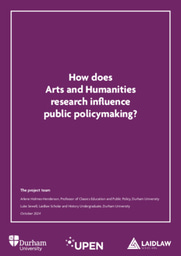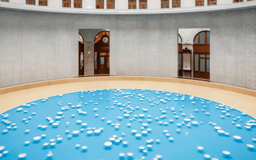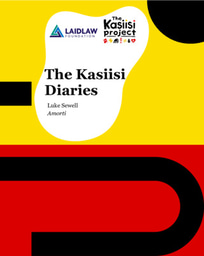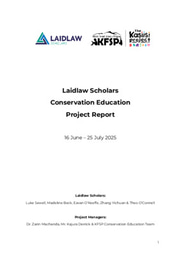Research Proposal: How has arts and humanities research influenced public policymaking

Introduction
I hope to work with Professor Arlene Holmes-Henderson to research 'how does Arts and Humanities research influence public policymaking?', in order to show how fields in the Arts and Humanities can have a positive impact on policymakers' decisions. Arts and Humanities are increasingly undervalued fields of academia. Examples of this include Sheffield Hallam University's 2022 decision to scrap their English Literature course.1 More recently was Oxford Brookes’ 2023 decision to close its music department.2 Such a decision came in the context of the government's agenda to decrease funding for supposedly 'low value' degrees, many of which happen to be in the Arts and Humanities.3 I believe that the methodologies used to determine what is a 'low value' field are predisposed to STEM and professional fields. Such fields may be more conducive to meeting certain direct socioeconomic goals. However, they are not as well suited to creating sophisticated value in ways in which the Arts and Humanities are excellent. The British Academy’s SHAPE group has helped show how this is the case.4 This project will provide further evidence for the many ways in which Arts and Humanities research brings value to society.
Project Methods and Outputs
It is in asking how Arts and Humanities research impacts policymaking where we may show its value. Arlene has made calls for scholars to share their experiences in interacting with policymakers. There have been responses from a wide variety of academics, and Arlene proposes that we follow these up in case studies. The case studies will show us how those in Arts and Humanities faculties may use their research to successfully engage with policymakers. Furthermore, the case studies will then be collated in an online brochure and evaluated in reports. The findings will also be shared in a blog for the Universities Policy Engagement Network (UPEN) and a presentation to UPEN's Arts and Humanities sub-committee. Such output will help reinvigorate positive perceptions of the Arts and Humanities faculties to governments, academics and the wider population.
Objectives
The project seeks to identify the problems Arts and Humanities scholars have found in trying to engage their research with policymakers. Arlene has suggested some government bodies lend a disproportionate amount of credence to select academics or sources, especially ones based in London. Indeed, controversies over government consultation from think tanks based at 55 Tufton Street in Westminster suggest that too narrow of a range of sources are reviewed in the policymaking process.5 Other pressing issues include the tendency to favour research concerning contemporary issues, much to the detriment of academics with historical concerns. By revealing the barriers scholars face in getting their research across to policymakers, we hope to provide the groundwork to deconstructing said barriers.
Arts and Humanities research may be useful to policymakers in ways that other disciplines might not. Another goal of our research is to find what is unique about Arts and Humanities when informing policy makers. This will help inform the case for specifically Arts and Humanities scholarly interest. Such a goal will help to redress the balance of respect paid to disciplines across academia.
Finally, we mean to find how academics may be incentivised to share their research with policymakers. This means reviewing all the factors which may affect scholars' willingness and ability to share research. My own research indicates that information failure is a key issue. I reached out to my own professors and all but one of them said they had not read the Institute for Government's 2020 publication 'How to engage with policymakers: a guide for academics in the Arts and Humanities', one which has been recommended by Arlene.6 Although many have had training similar to that which the guide offers, it still seems unfortunate that this handbook is not more widely disseminated given its respected authorship and target audience. I hope that by completing the project, we will show how we can better correct issues such as information failure to help incentivise the sharing of research.
Conclusion
In conclusion, Arlene's project will help raise the profile of Arts and Humanities research to policymakers. Not only will the behaviour of policymakers change, but Arts and Humanities scholars will be better equipped to successfully engage their research with policy actors. Furthermore, individuals beyond academic and governmental spheres may have a greater understanding of the importance of the Arts and Humanities to good governance. This will have a positive impact not just on the scholars and government actors involved, but on the rest of society
References
1) Sally Weale, 'Philip Pullman leads outcry after Sheffield Hallam withdraws English lit degree', https://www.theguardian.com/education/2022/jun/27/sheffield-hallam-university-suspends-low-value-english-literature-degree (last accessed 17th January 2024).
(2) Siena Linton, 'Oxford Brookes university scraps music department just before opening concern hall', https://www.classicfm.com/music-news/oxford-brookes-university-scraps-music-department/ (last accessed 2nd February 2024).
(3) Sian Hewitt, 'What is a "low-value" degree? Government prepares crackdown on universities'. https://www.standard.co.uk/news/uk/low-value-degree-government-crackdown-universities-b1094754.html#:~:text=Limits%20will%20be%20imposed%20on%20courses%20that%20do%20not%20have,previous%20numbers%20cap%20in%202015. (last accessed 17th January 2024).
(4) Vanessa Thorpe, 'University and Arts Council in drive to re-brand 'soft' academic subjects'. https://www.theguardian.com/education/2020/jun/21/university-and-arts-council-in-drive-to-re-brand-soft-academic-subjects (last accessed 30th January 2024).
(5) Joe Sommerlad, 'What is 55 Tufton Street? The house that "crashed" the UK economy', https://www.independent.co.uk/news/uk/politics/what-is-55-tufton-street-b2205193.html (last accessed 17th January 2024).
(6) Arlene Holmes-Henderson, 'Engaging with policymakers as a researcher in the Arts and Humanities: a guide to how, what and why', https://www.torch.ox.ac.uk/article/engaging-with-policymakers-as-a-researcher-in-the-arts-and-humanities-a-guide-to-how-what-an (last accessed 23rd January 2024)





Please sign in
If you are a registered user on Laidlaw Scholars Network, please sign in